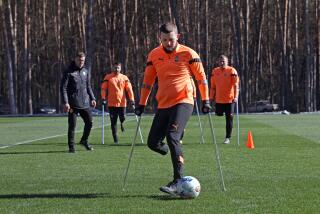There’s a reason that the soccer team rescued from a cave in Thailand was so tough and resilient
- Share via
Reporting from Mae Sai, Thailand — In the early 1990s, a gaggle of young novice monks huddled around a half-busted television at the heart of an ancient Buddhist pagoda in far northern Thailand.
They were waiting for their weekly dose of soccer — a one-hour highlights package from the English Premier League.
“The signal was bad, and the broadcast was in the Burmese language,” Kamol Chanthapoon said Wednesday, looking back on his childhood here in the region that straddles the Thai-Myanmar border. “But we memorized the time and channel and never missed out. That one hour was all we got.”
The son of pig and cattle breeders, Kamol worked livestock from an early age. There was no soccer team in Mae Sai. In fact, there wasn’t even a field.
Fast forward twentysomething years (superstition prevented him from sharing his exact age) and a humble little soccer club from this mountainous border town is the toast of the world, after 12 young players and their assistant coach were rescued in a daring operation from deep inside a flooded network of caves.
In late 2016, Kamol founded the Wild Boar soccer club — Moo Baa in Thai — to give local schoolboys in this impoverished community a place to go after their teachers had gone home. It is a grassroots club, funded by a community that sits on the edge of the Golden Triangle, one of the world’s most notorious drug-smuggling regions.
At least three of the rescued boys and their assistant coach, Ekapol Chanthawong, are stateless — members of ethnic minorities seen as easy prey for nefarious actors looking to sweep children into the drug trade.
In a nation obsessed with soccer, most of the 84 members are rejects from their school teams.
No one — not those from ethnic minorities facing persecution in Myanmar or discrimination in Thailand — was turned away.
“We are the club that would welcome and train anyone that wanted to play football,” said Kamol, his eyes covered by sunglasses after two weeks of sleepless nights spent fearing for the safety of the team. “Now the whole world knows about us. Our boys are resilient — just like the wild boar.”
The logo on Wild Boar jerseys depicts a fierce-looking animal: nose flared, eyes red, tusks sharp. “Look at it,” one of Kamol’s friends interjected, pointing at the emblem. “It is poised to strike.”
The Wild Boars transfixed people in Thailand and elsewhere after a group of team members, ages 11 to 16, went exploring in the Tham Luang Nang Non cave complex with Ekapol, 25, after soccer practice June 23.
They left their bicycles at the entrance, with precious soccer boots and backpacks lying nearby, and were trapped when torrential rains flooded the caves, blocking their escape. It was nine days before British divers found them. A three-day rescue beginning Sunday captivated world attention; it ended Tuesday with all of them safe, and hankering to watch the soccer World Cup on television.
Since the rescue, the boys and their coach have been kept in a hospital where they will stay for at least a week.
Kamol initially planned to name the club the Pigs — a nod to the family business he took over from his father. But that mascot was shot down after the idea was floated around the village. Public opinion held that the name sounded too soft, he said.
“Other teams would have been able to mock us: ‘We will eat you like a pig,’” he explained.
And so the Pigs became Wild Boars.
For the team, being tough and resilient is not just in the name. Part of it comes from fighting to win. Victories have been rare for the Boars, who are usually defeated in regional tournaments, where their squad of onetime discards take on teams for whom soccer is part of the school curriculum.
But the run of defeats ended in May, when the boys won a regional tournament, boosting their pride and confidence.
“They say we are just delicious pigs, but look what we got,” Kamol said, flashing an image on his phone showing him and the head coach, Nopparat Kanthawong, holding giant trophies — the spoils of victory in the May competition.
As Kamol flicked through photos of himself out cycling with some of his young Boars, he explained that tortuous 60-plus-mile rides along hilly roads in tropical heat were regular outings for the boys, some of them as young as 11.
There is no doubt, he said, that gritty upbringings in this wild outpost had hardened the boys for any challenge they might face in life — including being stranded in a dark cave with no food to eat, dank air to breathe and no sign of escape before their discovery.
Kamol has no offspring of his own. The disappearance of 12 Wild Boars hit him hard. After the last of them were brought to safety Tuesday evening, he retired to rice wine and the company of Thai navy SEALs who had pulled off the rescue. That helped him sink into a five-hour sleep, he said — more than he’d had for more than two weeks.
Behind dark shades, the whites of his eyes were stained with lines matching the giant red stone on his golden ring. He excused himself, unable to ignore phone calls from his wife any longer. Half a dozen plates of food laid out in front of him had barely been touched.
He finally took his leave and gestured toward the head coach, Nopparat, who was buzzing around behind him in a hot pink soccer shirt, fielding phone calls from reporters. “He is the one who is closest to the kids,” Kamol said.
News reports over the last two weeks have heavily featured Ekapol, the assistant coach who went into the cave with the boys and was the last to come out Tuesday, after completing a perilous journey through muddy waters and narrow, jagged passes with the assistance of rescue divers.
But Nopparat — known as Nop — worried day and night as the boys and Ekapol waited to be rescued.
“I am with them six or seven days a week,” the coach said. “If they are sick, I take medicine to their homes. If they are in hospital, I stay with them there.”
Although Nopparat is an assistant to the village headman and also an administrator for Kamol’s livestock business, the Wild Boars dominate his days. Mentoring them toward professional leagues is the work of his life.
“Coaching started as a hobby,” he said. “Now it consumes me.”
With rings on most fingers and precariously long fingernails, Nop moves awkwardly, at times jerkily. His only coaching qualifications are a backyard apprenticeship tutoring his niece and her friends, along with a course in soccer fundamentals. But he claims to have been wooed by some of the best-known school teams in the region because of his reputation with the Wild Boars.
“I am happier teaching kids who lack opportunity,” he said.
A number of his proteges have already been scooped up by regional teams, Nop said, where they earn a salary and a shot at the big time — opportunities he takes pride in delivering to kids with few others.
“I push them hard,” he said. “If I was just doing it for fun, the result would be strong, healthy kids. But the way I do it allows them to pursue their dreams.”
The club and its squad of unlikely heroes will be out of action for some time as they recover from a near-tragedy that has consumed a town, transfixed a nation and captivated the world.
But the Wild Boars will be back, as strong as ever, Nop said.
“Let them recover and you will see.”
Blomberg is a special correspondent. Special correspondent Sasiwan Mokkhasen contributed to this report.
More to Read
Sign up for Essential California
The most important California stories and recommendations in your inbox every morning.
You may occasionally receive promotional content from the Los Angeles Times.













